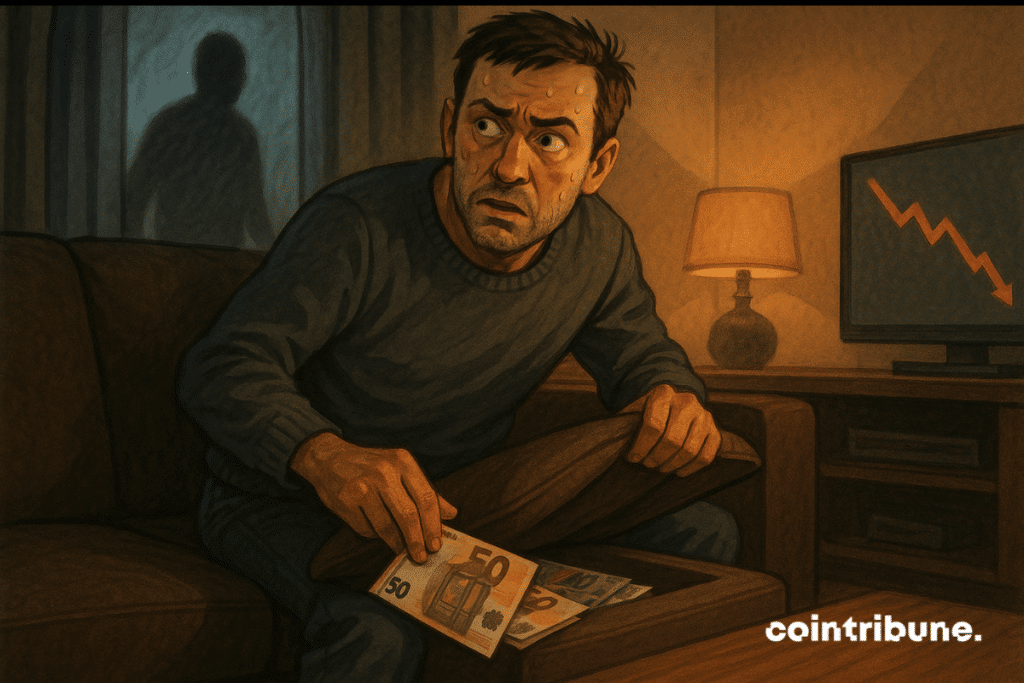ECB Urges 100 € Cash Reserve Per Person For Crises
While Europe accelerates towards digital payments and prepares the digital euro, the ECB creates a surprise. It recommends keeping cash at home. This injunction reveals a reality too often overlooked in official speeches: the fragility of digital systems in the face of crises. Such a deliberate return to cash does not mark a step backwards, but a clear anticipation of systemic risks, between outages, geopolitical tensions and cyberattacks.

In brief
- The European Central Bank recommends that citizens keep a small amount of cash at home in case of crisis or digital system failure.
- This recommendation follows lessons learned from recent crises, where cash helped maintain basic exchanges despite temporary infrastructure collapses.
- The ECB mentions a suggested amount of 70 to 100 euros per person to cover essential needs for about 72 hours.
- This return to cash is motivated by concrete risks: cyberattacks, blackouts, geopolitical tensions, or banking crises.
Cash as direct insurance against major crises
The European Central Bank (ECB) has reiterated a clear message: European citizens should keep a reserve of cash at home, in a context of Europe’s collapse.
This advice, echoed by several national authorities such as those of the Netherlands, Finland, or Austria, is not meant to encourage massive hoarding, but to ensure a minimum level of individual security. The ECB mentions a simple objective : to allow each person to meet their essential needs for 72 hours in case of serious disruption.
The amounts mentioned are modest: between 70 and 100 euros per person. This sum is considered a direct insurance in case of crisis. The message, relayed by several financial institutions, is unequivocal : “always have cash at home, just in case”.
This advice is based on lessons learned from recent crises, where cash proved its resilience. Unlike digital systems, banknotes work without internet connection, without electricity, and without authorization from a third party. Here are the main scenarios identified by authorities where cash remains essential :
- A power outage or blackout : in case of massive cut, payment terminals become unusable, making any purchase of basic necessities impossible ;
- A geopolitical or military crisis : as in Ukraine, tensions can cause disruptions in banking services or massive capital flight ;
- Temporary collapse of banking networks or cyberattack : a large-scale cyberattack could neutralize financial infrastructures for several days ;
- A systemic financial crisis : as in Greece in 2015, withdrawal limits or bank closures can block access to digital accounts ;
- A localized technical failure : a simple regional network failure can be enough to paralyze electronic payment methods.
In these situations, cash remains the last safety net to access essential goods, especially in the first hours of a crisis. This precautionary logic, which the ECB calls a “liquidity network”, aims to strengthen the economy’s robustness against unexpected events.
Towards a monetary rebalancing and a debate on individual freedoms ?
Beyond the simple security dimension, this position raises the question: what role do we really want to assign to cash in our digital societies ?
While the ECB insists on the usefulness of cash in case of crisis, it also highlights its structural qualities : “cash […] guarantees a confidentiality that digital payments do not offer”, recalls the institution.
This statement fits into a context where payment systems are increasingly concentrated in private hands, and where digital traceability becomes the norm. In Finland, there is even consideration to deploy crisis-proof ATMs capable of operating independently of networks if needed.
This vision of cash as a technical and political counter-power introduces a new paradigm in the European monetary debate. By enabling unmonitored transactions, not subject to algorithms or potential banking blockades, cash preserves a form of individual autonomy that some consider essential to democracy.
In this context of perceived fragility of traditional payment systems, some analysts see an indirect opportunity for bitcoin. As a non-sovereign, decentralized asset accessible without intermediaries, it offers a credible alternative to classic forms of value storage.
Ultimately, cash also ensures diversity in payment methods, essential to avoid any monopoly in economic exchanges. The fact that the ECB itself defends this plurality, while advancing the development of the digital euro even if the project faces delays, suggests a willingness to maintain a balance between technological innovation and social stability.
Maximize your Cointribune experience with our "Read to Earn" program! For every article you read, earn points and access exclusive rewards. Sign up now and start earning benefits.
Diplômé de Sciences Po Toulouse et titulaire d'une certification consultant blockchain délivrée par Alyra, j'ai rejoint l'aventure Cointribune en 2019. Convaincu du potentiel de la blockchain pour transformer de nombreux secteurs de l'économie, j'ai pris l'engagement de sensibiliser et d'informer le grand public sur cet écosystème en constante évolution. Mon objectif est de permettre à chacun de mieux comprendre la blockchain et de saisir les opportunités qu'elle offre. Je m'efforce chaque jour de fournir une analyse objective de l'actualité, de décrypter les tendances du marché, de relayer les dernières innovations technologiques et de mettre en perspective les enjeux économiques et sociétaux de cette révolution en marche.
The views, thoughts, and opinions expressed in this article belong solely to the author, and should not be taken as investment advice. Do your own research before taking any investment decisions.